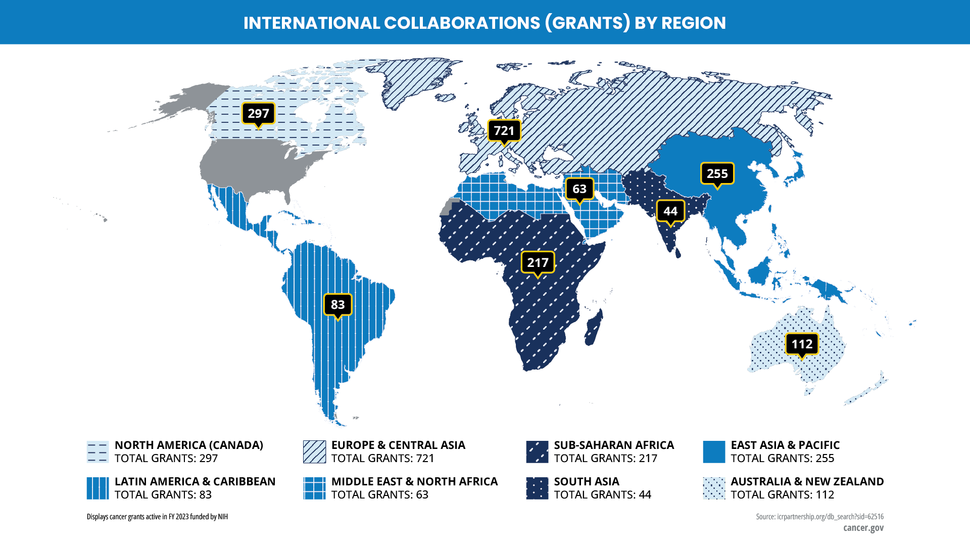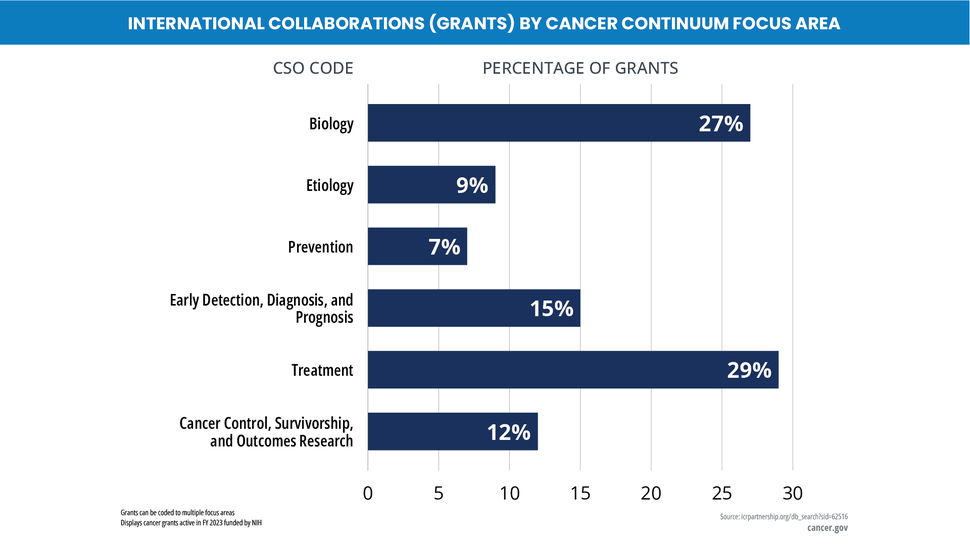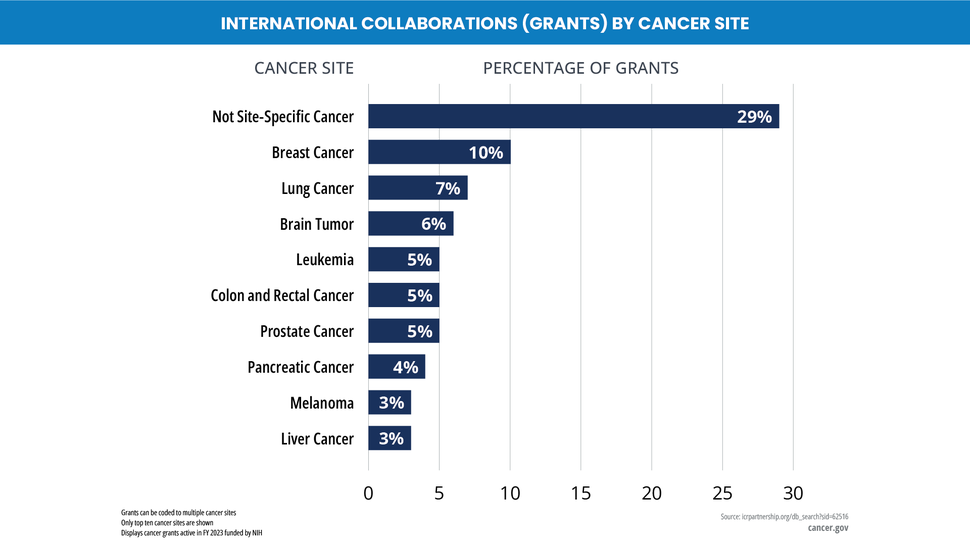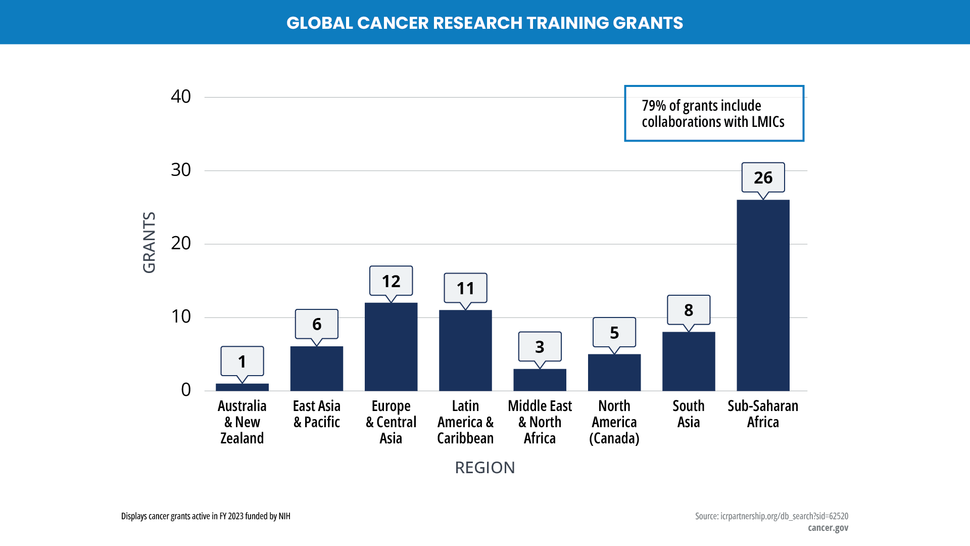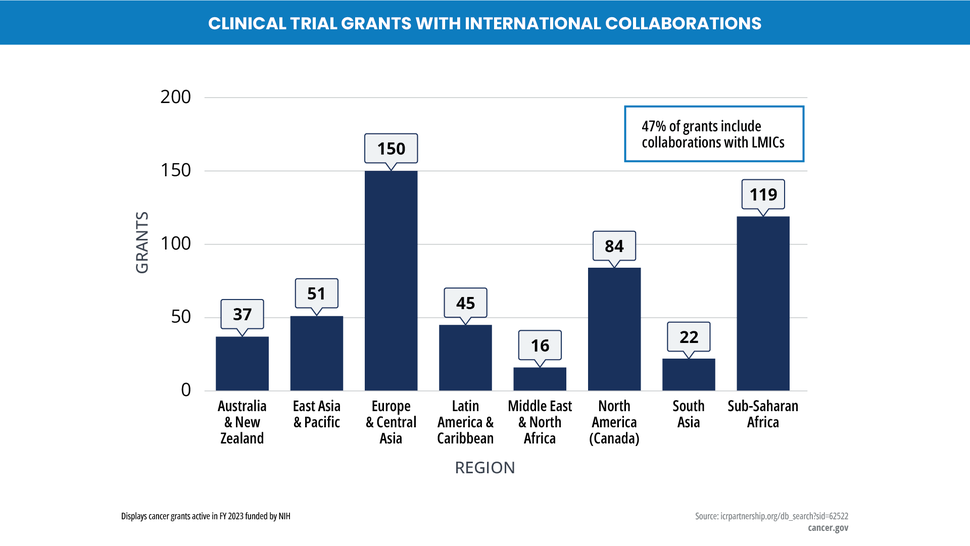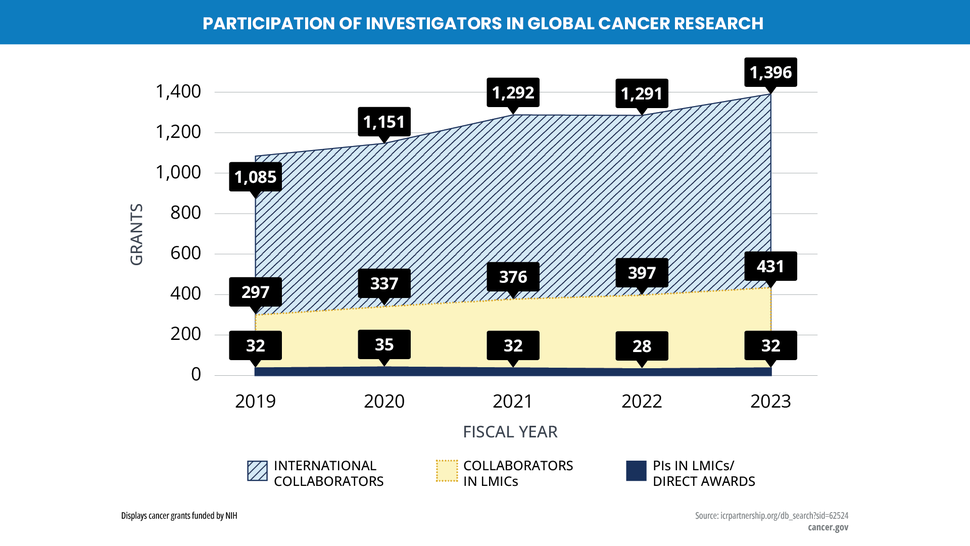Overview of the ICRP
The International Cancer Research Partnership (ICRP) is an alliance of cancer research funding organizations, including the Center for Global Health (CGH), that collaborate and strategically coordinate opportunities for cancer research across the globe.
Impact of ICRP
ICRP helps define the landscape of global cancer research and identify opportunities for stronger collaboration. It does this by:
- partnering with 173 government, public, and nonprofit international funding organizations that represent over $80 billion in investments for cancer research since 2000
- managing a public database of information about funded cancer research projects, so users can find projects and collaborators and avoid duplicate efforts
- assessing trends in cancer research over time using the database
- hosting annual meetings and monthly webinars for cancer research funding organizations to share information and explore partnerships
International Portfolio At a Glance
CGH tracks and analyzes NCI-supported research with international collaborators. These data help us recognize priorities, identify gaps, and foster collaborations between NCI, US-based institutions, and international institutions. CGH has a primary focus on increasing cancer research and capacity-building in low- and middle-income countries (LMICs), therefore, the involvement of researchers based at institutions in LMICs is often highlighted in the data below.
This portfolio includes both direct awards to international institutions and domestic awards with international collaborators. Domestic awards with international collaborators make up the majority (>95%) of NCI’s international extramural grants. This portfolio also includes collaborators in countries of all income classes and world regions. Income classes and regions are defined by the World Bank, and NCI’s collaborations with LMICs is inclusive of countries categorized as low income, lower-middle income, and upper-middle income.
The data presented here are sourced from the National Institutes of Health (NIH) and shared with our partners at ICRP. Click on the source in images below to reach the ICRP database and search for cancer research funded by NIH or other ICRP partners.
International Collaborations (Grants) by Region
CGH’s core value of collaboration reflects an awareness of the enormity of global cancer as a public health problem, beyond the capacity of CGH or NCI to address alone. Collaborative global research is key to achieving progress, and NCI funds global cancer research with principal investigators and collaborators in all eight world regions.
Displays cancer grants active in FY 2023 funded by NIH
Source: https://www.icrpartnership.org/db_search?sid=62516
International Collaborations (Grants) by Cancer Continuum Focus Area
NIH funds global cancer research across the cancer continuum, as represented by the Common Scientific Outline codes. Out of six scientific focus areas, 29% of grants are coded to treatment and 27% are coded to biology. This aligns with CGH’s strategic research theme of increasing the understanding of cancer etiology and biology through collaborations with global investigators and populations.
Prevention research is currently the lowest funded category, accounting for just 7% of grants. Grants can be coded to multiple focus areas.
Displays cancer grants active in FY 2023 funded by NIH
Source: https://www.icrpartnership.org/db_search?sid=62516
International Collaborations (Grants) by Cancer Site
Cancer is not a single disease, and different cancer types require different prevention, detection, treatment, and control strategies. NIH funds global cancer research across more than fifty cancer sites in the body, and over a quarter of grants are not site-specific, meaning they apply to all cancer sites.
The image below shows the ten most studied cancer sites in the NIH global cancer research portfolio.
Displays cancer grants active in FY 2023 funded by NIH
Source: https://www.icrpartnership.org/db_search?sid=62516
Global Cancer Research Training Grants
CGH supports participation by international investigators in relevant NCI cancer research training curricula, co-funding for early career awards for global oncology researchers, and support for institutional research training collaborations between US institutions and international institutions. CGH’s training support focuses on investigators based on low- and middle-income countries (LMICs) to enable equitable and impactful global scientific collaboration. Although research training makes up a small proportion of NIH’s global cancer research portfolio, it is a higher proportion of grants with collaborators in LMICs, especially in sub-Saharan Africa.
In FY2023, 79% of research training grants included collaboration with LMICs.
Displays cancer grants active in FY 2023 funded by NIH
Source: https://www.icrpartnership.org/db_search?sid=62520
Clinical Trial Grants with International Collaborations
CGH supports clinical trials with international collaborators and at international institutions as a key part of its research strategy. Given the critical importance of NCI-supported clinical trials in advancing progress against cancer, the limited NCI-supported clinical trials footprint in LMICs can likely be increased to realize important scientific opportunities. NIH currently funds some clinical trials in LMICs by providing dedicated support for investigator-initiated clinical trials at NCI-Designated Cancer Centers with strong LMIC institution partnerships and by collaborating with other internal and external partners.
In FY2023, 47% of clinical trial grants included collaboration with LMICs.
Displays cancer grants active in FY 2023 funded by NIH
Source: https://www.icrpartnership.org/db_search?sid=62522
Participation of Investigators in Global Cancer Research
CGH supports innovative, impactful research in global cancer control through international collaboration. One of NCI’s strategic priorities is to increase the portfolio of NCI extramural funding involving collaborators in LMICs by developing new extramural funding initiatives and collaborating with other NCI extramural divisions and NIH ICOs.
Displays cancer grants funded by NIH
How to Connect
Organizations interested in becoming a partner are welcome to visit the ICRP website and follow the application guidelines.
For information about ICRP, please contact Operations Manager, Lynne Davies.
For more information about NCI's role in ICRP, please contact Ms. Elise Garton and Ms. Tosca Le.
Collaborators
Since 2000, ICRP partners have represented a wide range of governmental, public, and nonprofit cancer research funding organizations from across the world. See the full list of ICRP partners and funding organizations.
